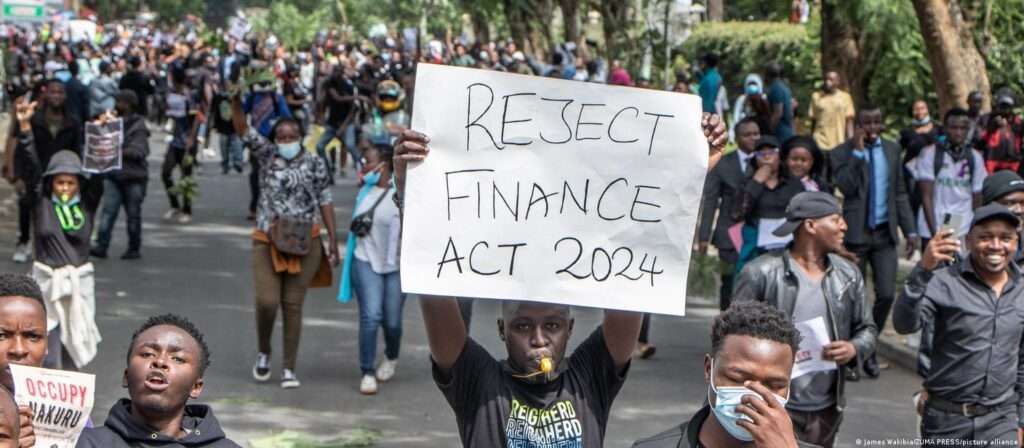President William Ruto faces a challenging dilemma with his tax bill despite extending an olive branch to protesters for dialogue.
Kenyan youth, especially from Generation Z, have been leading protests under the banner “Occupy Parliament,” opposing the proposed Finance Bill, 2024.
The demonstrators insist on the complete withdrawal of the bill or its outright rejection by MPs to end their street demonstrations.
Scheduled for Tuesday, the Finance Bill, 2024 will move to the Committee Stage where amendments will be deliberated and voted upon clause by clause in the National Assembly.
In anticipation of this pivotal vote, protesters are gearing up to continue their demonstrations until MPs conclude their final deliberations on the bill, unless it is rejected beforehand.
Ruto’s options may be limited to advocating for amendments already promised by his administration.
Recently, the President convened a parliamentary group meeting of his Kenya Kwanza government at State House, announcing a series of concessions.
Kimani Kuria, Chairperson of the Finance and National Planning Committee, confirmed plans to propose amendments to the bill as initially drafted by the National Treasury.
These amendments include repealing the controversial 2.5% motor vehicle circulation tax, exempting bread from value-added tax, and lifting excise duty on edible oils in response to public outcry.
Additionally, the government intends to pause a proposal granting the Kenyan Revenue Authority unrestricted access to individuals’ mobile money and banking details without a court warrant.
With sufficient support in the National Assembly, the President is poised to secure passage of these amendments during Tuesday’s committee stage.
Last Thursday, MPs approved the bill at the Second Reading with a vote of 204 to 115.
Ultimately, the bill requires a simple majority at each stage, including the critical third reading, for final approval or rejection.
The President can defer the Bill
MPs have the authority to potentially block the Finance Bill, 2024 by choosing to defer or reject its Third Reading following the committee stage, a decision that requires a simple majority vote.
If President Ruto opts to heed public pressure, he can mobilize MPs to vote on deferring the Third Reading after amendments are made. According to the Kenya Law Reform Commission, deferring a bill at the Third Reading stage effectively “kills the bill,” necessitating a waiting period of six months before it can be reintroduced. Any reintroduction would need to include new provisions different from those originally proposed.
This potential action by MPs would mark the first instance in Kenya’s legislative history for such a bill. Despite a deferment, the government would still be permitted to collect revenue based on the provisions of the Finance Act 2023, though not from the Finance Bill, 2024.
Renowned economist and former Mandera Senator Billow Kerrow asserts that even if the bill is deferred or rejected, the government can continue collecting the anticipated revenue for the 2024/25 fiscal year, amounting to approximately Sh 3.4 trillion, minus the targeted additional Sh 346 billion specified in the Finance Bill, 2024. He stresses that this would not lead to a government shutdown, contrary to some perceptions.
However, a rejection or deferment of the Finance Bill, 2024 would hinder the government’s ability to enact the Appropriation Act of 2024. This act, which outlines government spending, requires prior approval of revenue-raising measures as per a High Court ruling from the previous year. In the absence of the Finance Act, the government could only access approximately half of the presently approved spending estimates, affecting its ability to fully implement budgetary plans.
In summary, while the decision to defer or reject the Finance Bill, 2024 could potentially alleviate immediate public concerns, it carries significant implications for the government’s fiscal operations and legislative process in Kenya.
Ruto can allow his troops to consider and pass new amendments
Another strategic option available to President Ruto is to rally his parliamentary allies to support specific amendments proposed by MPs, particularly those aligned with the opposition coalition, Azimio la Umoja. This approach could serve to address public dissatisfaction with the Finance Bill, 2024.
Azimio la Umoja has been vocal in criticizing the bill, labeling its tax proposals as punitive. Last year, despite efforts led by Minority Leader Opiyo Wandayi and his MPs to block the bill, their attempts were unsuccessful.
Wandayi emphasized their stance, describing the proposed taxes as punitive and suggesting that rejecting them aligns with the interests of conscientious leaders.
Among the amendments proposed by Azimio la Umoja is the repeal of the 10% tax on clinkers used in cement production, which they argue hampers economic growth. They also advocate for the removal of the export promotion tax and the proposed Sh9 per litre increase in fuel levies, framing these changes as minimal requirements.
President Ruto could opt to allow these opposition-backed amendments to pass through Parliament. Doing so could potentially appease public discontent surrounding the Finance Bill, 2024, demonstrating responsiveness to public concerns and fostering a broader consensus on fiscal policies.
This approach would represent a political maneuver aimed at balancing governmental objectives with public sentiment, ultimately influencing the trajectory of the bill as it progresses through legislative deliberations.
Ruto could abandon proposed tax measures in the Finance Bill, 2024
In light of the challenges posed by public resistance and parliamentary dynamics surrounding the Finance Bill, 2024, President Ruto may weigh the option of abandoning the proposed tax measures aimed at generating an additional Sh346 billion in revenue.
This decision could lead the government to explore alternative avenues to finance the budget deficit, such as increased borrowing. By opting for borrowing, the government aims to cover the shortfall in revenue while maintaining its planned expenditure levels.
Alternatively, the administration could prioritize fiscal prudence and efficiency by scrutinizing non-essential expenditures and enhancing revenue generation within the existing legal framework. This approach would involve maximizing revenue collection through improved tax administration, compliance measures, and economic growth strategies.
Historically, the Kenyan government has relied on introducing new revenue measures to bolster its budgetary resources. However, current circumstances, including public dissatisfaction and legislative challenges, may prompt a reassessment of this strategy in favor of more sustainable fiscal practices.
Ultimately, President Ruto’s decision will hinge on balancing the need for adequate revenue to fund essential government services against public and political considerations regarding tax burdens and economic impacts.


